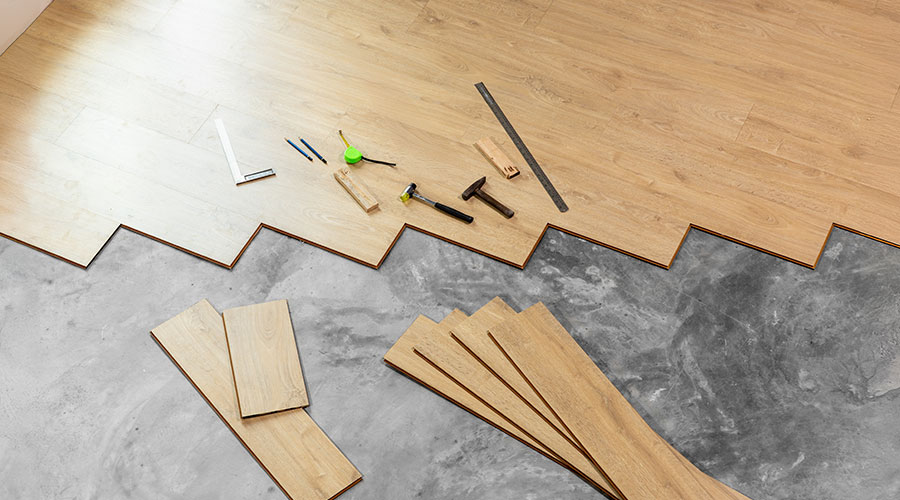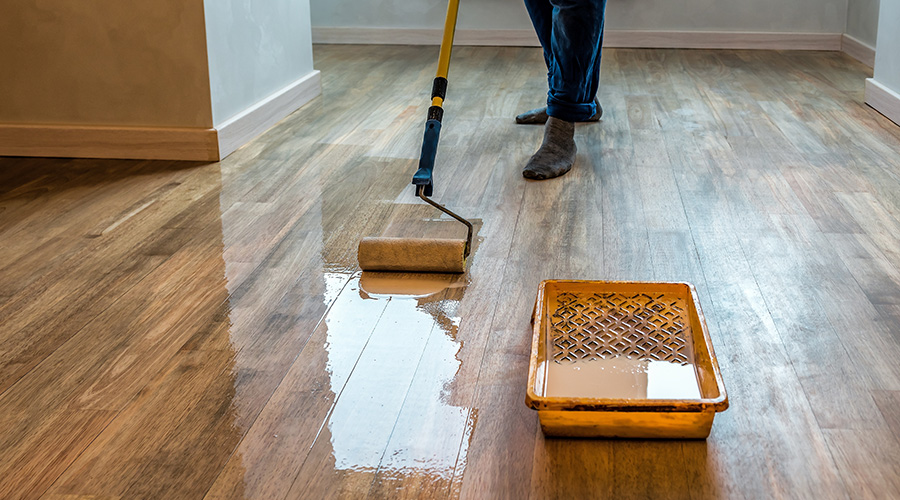To Avoid Flooring Installation Problems, Seek Project Management Expertise
OTHER PARTS OF THIS ARTICLEPt. 1: This Page
REPORT PREPARED FOR STARNET COMMERCIAL FLOORING COOPERATIVE
It’s easy for facility executives to make the mistake of underestimating the value of proper flooring installation. But that error can lead to delays and increased costs. A qualified commercial flooring contractor can ensure that installation goes smoothly. They have the project management experience and expertise to prevent problems, say members of the Starnet Commercial Flooring Cooperative.
Proper flooring installation is no easy matter. The nature of the construction process dictates that flooring installation is often one of the last steps taken. If problems with any of the earlier steps put the project behind schedule, the flooring installation can be rushed.
That’s the wrong time to try to cut costs by cutting corners. A knowledgeable commercial flooring contractor has the background to ensure that flooring is properly installed in the most time-efficient, as well as cost-effective, manner possible.
Proper project management is a key to avoiding unforeseen cost and construction timeline overruns during flooring installation, says Randy Weis, the president of RD Weis Companies and chairman of the board for Starnet.
“Poor planning and project definition, or inaccurate timelines that can only be accomplished through overtime, often lead to costs that grow beyond expectations,” he says.
Penny-Wise, Pound-Foolish
Given today’s economy, it is tempting to skimp a little by going directly to manufacturers for flooring products. But that route can lead to higher costs. That’s why facility executives should consider a commercial flooring contractor with solid project management experience that can prevent the problems that lead to higher costs and delays.
“We know of one local organization (in the Washington, D.C., market) that was building out space, and they were going to save money by buying direct,” says Ralph Grove, vice president of Commercial Group, Commercial Carpets of America. He also chairs Starnet’s Best Practices Committee. “They ended up hiring out a crew from outside the area to save a bit of money.”
But the installation didn’t go as planned. A semitrailer with rolls of carpeting arrived on site, but the organization didn’t have the forklifts needed to lift long rolls of carpeting. So the semi driver had to be paid to deliver the carpeting to a nearby warehouse, where it sat for several weeks while facility executives determined that they would have to rent a crane to get the carpeting into the building. The building also lacked freight elevators that could handle complete rolls of carpeting.
When the carpeting finally did get on site, the crew had to roll it out in the parking garage and cut it there, since there was no other space available to them. After that, they hauled it up the stairwells to finish the installation. One can imagine how dirty the carpet backing must have been after it was rolled out in a parking garage
The end result, says Grove: project delays and carpeting that cost more to install than was originally planned. A qualified and experienced commercial flooring contractor could have spared the facility executive both the delays and the added costs.
Impact of the Economy
The current state of the economy affects more than just the organizations that need new flooring; it affects mills and resilient flooring manufacturers as well. A commercial flooring contractor who understands changing market conditions can help facility executives avoid unpleasant surprises.
“Quite simply, there are now longer lead times than there were even two or three years ago because mills aren’t keeping inventory like they used to,” says Grove.
Another factor adds to lead time. Like many items today, a lot of flooring products are made overseas. The freight-on-board costs might be lower and save both manufacturers and end-users precious dollars, but the savings can come at the cost of time.
All of this means that facility executives need to be aware of potential delays or longer lead times when specifying projects and planning timelines. A qualified commercial flooring contractor can provide valuable guidance to help keep projects on budget and on schedule.
Potential delays in obtaining product aren’t the only market changes that facility executives might not be aware of. “It’s also a mistake to estimate costs based on historical data instead of using current pricing,” says Weis.
Although many material costs are up, other factors such as deflationary pressure and the economy are driving some prices down. Facility executives with the means to make new purchases can bargain for deals in this economic climate. By working with a qualified commercial flooring contractor, facility executives can take best advantage of current flooring market conditions.
Avoiding Disruption
To save organizations — particularly those that don’t have the luxury of swing space — the cost of business disruptions, many commercial flooring contractors use lifts to move furniture and minimize installation times. They also work at night when possible, to avoid costly interruptions during the workday.
“We have systems for replacement work where we replace carpeting without having to pull out computers and cabling,” says George Holinga, the CEO of Legacy Commercial Flooring, a member of Starnet .
The labor savings for organizations that don’t have to take down systems furniture, or disconnect the computers and phones, can be significant.
Legacy used a library lift system recently that lifted entire stacks of books without having to remove them from the shelving, saving the library the time and money that would have been required for re-cataloguing its inventory. Commercial flooring contractors have an array of specialty lifts that can be used to reduce disruption of clients’ business operations, Holinga says.
Be Prepared
No matter how well-planned a project is, unexpected conditions and other surprises can threaten both the budget and the schedule for flooring installation. One benefit of working with a qualified commercial flooring contractor is that those firms are always ready to go to Plan B to ensure that the project stays on track.
Grove describes one retrofit that involved tearing out a non-load-bearing wall. In the process of removing the wall, the flooring contractor discovered a “ridge” in the existing poured concrete floor. “There was a half-inch drop from the area that had been the hallway into the new, opened space,” he says. As a result, a shallow ramp had to be built for a better transition.
The solution was simple, but any project can run into situations that slow down the original installation timeline. An experienced commercial flooring contractor will have the resources and knowledge to minimize the impact of those surprises.
Value of Maintenance
Facility executives understand the importance of maintaining the heating and cooling system or the fire sprinkler system. But too many fail to appreciate that flooring too will last longer when properly maintained. Commercial flooring contractors have the expertise to provide the proper maintenance for any type of flooring a facility may install.
“We will extend warranties for installation if we’re also doing the maintenance,” says Holinga. “We’ve done the cost analysis and almost every single time we have learned that with proper maintenance we can extend the life of flooring by four, five or six years.”
Grove has several clients in the Washington, D.C., area with strict building-access regulations for security reasons.
“The nature of their business just doesn’t allow the maintenance access we would like,” he says. The result is that the carpeting in one facility has looked “terrible” for lack of care during the last three years.
Sometimes, upgrading a maintenance program is the best option for cash-strapped organizations. In extreme situations — if a facility executive simply cannot afford new carpeting — Holinga suggests deferring installation and using a maintenance plan instead that extends the life of existing flooring for another couple of years. By working with a qualified commercial flooring contractor, facility executives can determine a course of action that best meets the needs of the organization.
In weighing any budget cuts affecting flooring installation, facility executives should ask themselves several obvious questions: “What can be cut?” And “What absolutely should not be cut?” Striking that middle ground is vital now more than ever.
Time and again, commercial flooring contractors say that the quality of the installation matters most.
“A lower-priced product with good installation and sound maintenance will outperform a higher-priced product with bad installation and inadequate maintenance,” says Holinga.
There’s another question facility executives should ask themselves: “Say we trim too much from the budget — what then? What is the worst that could happen?”
“That’s easy,” says Grove. “It will look bad at best, fail at worst.”
Facility executives can avoid those unfortunate results by working with a qualified commercial flooring contractor. Together, they can determine how best to allocate the budget, then ensure that flooring is properly installed and maintained to maximize the investment in flooring. 
About Starnet
Starnet Commercial Flooring Cooperative is a member-owned-and-run cooperative of more than 165 commercial flooring contractors with more than 280 worldwide service locations. It was established in 1992 to provide a means of ensuring the professionalism of flooring contractors.
To join Starnet, a flooring contractor must meet several standards: For instance, each contractor must show a history of successful installations in its market area, as demonstrated through client testimonials.
Starnet members also must be financially stable, as the organization does a full credit check on applicants. That allows Starnet to determine whether the contractor is able to purchase products for customers.
In addition, members agree to attend Starnet’s annual meeting to share and benchmark best practices.
|
Incentives Can Keep Projects on Track
Because flooring installation is one of the final items in a construction timeline, it can be delayed by many factors. One strategy to avoid problems, says Randy Weis, the president of RD Weis Companies and chairman of the board for Starnet Commercial Flooring Cooperative, is to offer incentives — both for commercial flooring contractors and other trades — that help guarantee projects are done on time and within budget. Offering bonuses to contractors and subcontractors who finish ahead of schedule is a proven method of ensuring projects are completed ahead of schedule.
Facility executives need to be mindful that haste sometimes generates waste; one of the unintended consequences that sometimes plagues projects completed too quickly is substandard performance in quality or workmanship. Here again, facility executives can incentivize contractors with performance clauses in the contracts.
|
Related Topics:











